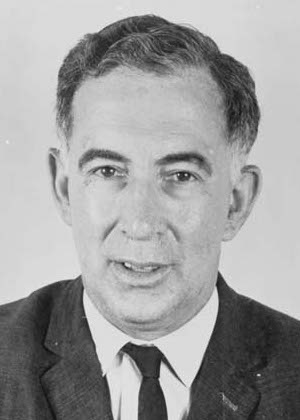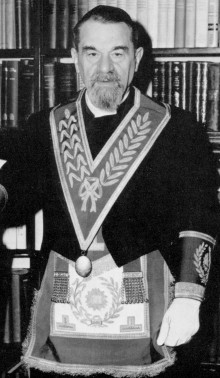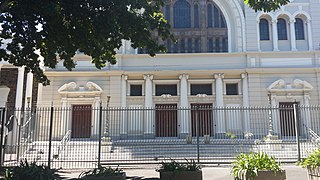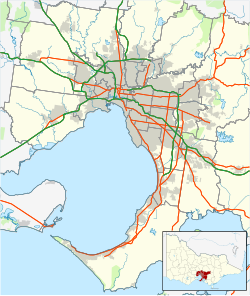
The National Gallery of Victoria, popularly known as the NGV, is an art museum in Melbourne, Victoria, Australia. Founded in 1861, it is Australia's oldest and most visited art museum.
The Melbourne Museum is a natural and cultural history museum located in the Carlton Gardens in Melbourne, Australia.

Sir Zelman Cowen, was an Australian legal scholar and university administrator who served as the 19th Governor-General of Australia, in office from 1977 to 1982.

State Library Victoria (SLV) is the state library of Victoria, Australia. Located in Melbourne, it was established in 1854 as the Melbourne Public Library, making it Australia's oldest public library and one of the first free libraries in the world. It is also Australia's busiest public library and, as of 2023, the third busiest library globally.

Sir Israel Brodie was the Chief Rabbi of Great Britain and the Commonwealth 1948–1965.

The history of Jews in Australia traces the history of Australian Jews from the British settlement of Australia commencing in 1788. Though Europeans had visited Australia before 1788, there is no evidence of any Jewish sailors among the crew. The first Jews known to have come to Australia came as convicts transported to Botany Bay in 1788 aboard the First Fleet that established the first European settlement on the continent, on the site of present-day Sydney.

The Jewish Museum of Florida-FIU is a museum that is a department of Florida International University that preserves Florida Jewish history, culture, and art and is located in two restored historic buildings that were formerly synagogues, at 301 & 311 Washington Ave., in Miami Beach, Florida. The main museum building, at 301 Washington Ave., was built in 1936, is on the National Register of Historic Places, has Art Deco features, a copper dome, a marble bimah, and 80 stained glass windows. The adjacent building located at 311 Washington, which served as Miami Beach's first synagogue, was purchased by the museum in 2005 and restored in 2007 as a museum expansion.

David Solomon is an Australian educator, scholar, editor, translator and writer. His main focus is in the area of Jewish education.

The Gardens Shul, formally the Cape Town Hebrew Congregation (CTHC), also called the Great Synagogue, is a Modern Orthodox Jewish congregation and synagogue, located in the Company Gardens, in the Gardens neighborhood of Cape Town, South Africa. The congregation was established in 1841, making it the oldest Jewish congregation in South Africa.

The Melbourne Hebrew Congregation, or Toorak Shule, is the oldest Jewish congregation in Melbourne, Victoria, Australia. Formed in 1841, the congregation was originally located on Bourke Street before moving in 1930 to Toorak Road, South Yarra.

Australian Jews, or Jewish Australians, are Jews who are Australian citizens or permanent residents of Australia. In the 2021 census there were 99,956 people who identified Judaism as their religious affiliation and 29,113 Australians who identified as Jewish by ancestry, an increase from 97,355 and 25,716, respectively, from the 2016 census. The actual number is almost certainly higher, because being a Jew is not just about being religious, but the census data is based on religious affiliation, so secular Jews often feel it would be inaccurate to answer with "Judaism". Also, since the question is optional, many practising Holocaust survivors and Haredi Jews are believed to prefer not to disclose their religion in the census. By comparison, the Israeli newspaper Haaretz estimated a Jewish-Australian population of 120,000–150,000, while other estimates based on the death rate in the community estimate the size of the community as 250,000, which would make them 1% of the population. Based on the census data, Jewish citizens make up about 0.4% of the Australian population. The Jewish community of Australia is composed mostly of Ashkenazi Jews, though there are Jews in Australia from many other traditions and levels of religious observance and participation in the Jewish community.

The Melbourne Holocaust Museum (MHM) was founded in Elsternwick, Melbourne, Australia, in 1984 by Holocaust survivors. It is currently Australia’s largest institution dedicated to Holocaust education, research & remembrance. Its mission is to commemorate the six million Jews murdered by the Nazis between 1933 and 1945, and amplify the voices of Holocaust survivors, to inspire a better future free from antisemitism, racism and prejudice.
The Elwood Talmud Torah Hebrew Congregation, also known as Elwood Synagogue or Elwood Shule, is a historically significant Orthodox synagogue located in the Melbourne suburb of Elwood, Victoria, Australia. The congregation played an important role in accommodating Melbourne's large population of Jewish Holocaust survivors following World War II.

The East Melbourne Hebrew Congregation, also known as East Melbourne Shule, East Melbourne Synagogue, Melbourne City Synagogue or City of Melbourne Synagogue is an Orthodox Jewish congregation and historically significant synagogue, located in East Melbourne, Victoria, Australia. The synagogue, consecrated in 1877, is the oldest in Melbourne.

The Jewish Community Council of Victoria Inc (JCCV) is the main representative body for Victorian Jewry, representing 52 Jewish community organisations and over 60,000 Victorian Jews. The JCCV's mission is to represent the Victorian Jewish community, the largest Jewish community in Australia, and deal with matters that affect its status, welfare and interests. The JCCV was established in 1938 as the Victorian Jewish Advisory Board. It has been known as the Jewish Community Council of Victoria since 1989 and became incorporated in 2000.
Temple Beth Israel (TBI) is a Progressive Jewish congregation and synagogue, located in St Kilda, an inner seaside suburb of Melbourne, Australia. The organisation is a member of the Union for Progressive Judaism, an umbrella organisation for Progressive Judaism in Asia and the Pacific.
Raphael Benjamin was an English-born rabbi who ministered in Australia and America.
The city of Frederick, Maryland is home to a small but growing Jewish community. With roots dating to the colonial era, Frederick's Jewish community is home to three synagogues, a Hebrew school, and a Jewish community center.
Temple David is a Progressive Jewish congregation and synagogue located in Mount Lawley, an inner northern suburb of Perth. It is the sole progressive congregation in the state of Western Australia. The congregation was established in 1952.














